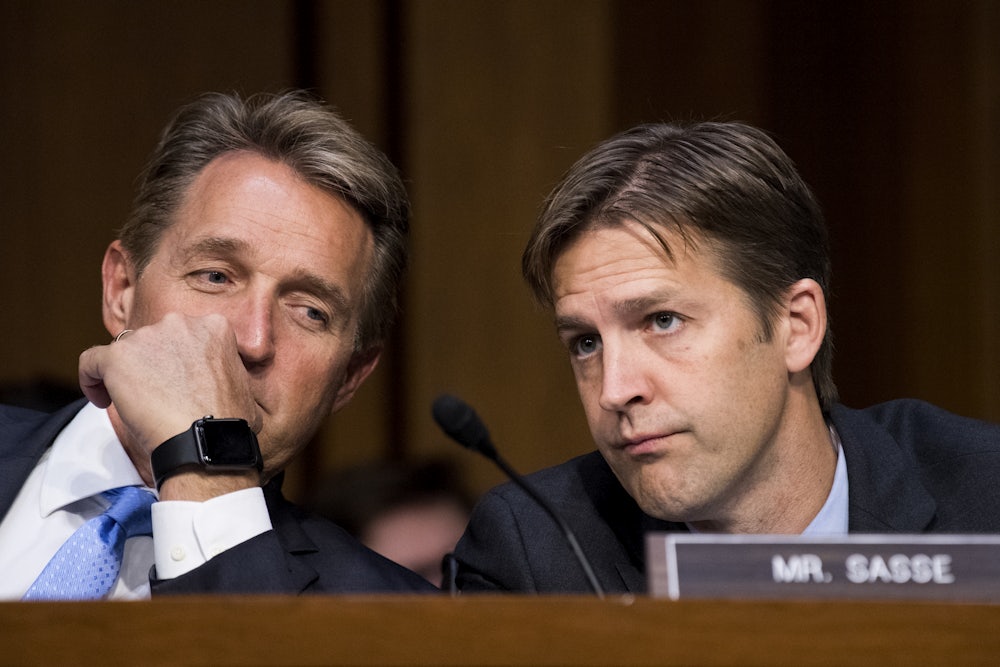Like many establishment Republicans, Juleanna Glover loathes what Donald Trump is doing to her party. A former adviser to George W. Bush, Jeb Bush, and John McCain, Glover announced in a New York Times column that “disaffected Republicans are wondering whether, if they came up with a truly great candidate, they could jump-start a new party, just as the original Republicans did in the 1850s.” Glover claims that her imagined third party would appeal to “centrists” who can’t abide Trump but are also wary of a Democratic Party that might nominate a progressive like Elizabeth Warren or, heaven help us all, Bernie Sanders.
To achieve the goal of bringing the sensible center together, Glover suggests running “a Joe Biden-Ben Sasse independent ticket.” Her other dream candidates include GOP senators Jeff Flake or Bob Corker; GOP governors Larry Hogan of Maryland, John Kasich of Ohio, or Charlie Baker of Massachusetts; and random CEOs and celebrities like Oprah, Ginni Rometty of IBM, or Jamie Dimon of JPMorgan Chase.
Glover’s fantasy league is top-heavy with Republicans because she’s trying to solve a problem that besets the GOP rather than the larger polity. While Democrats have their own share of internal divisions, they have largely rallied together in opposition to Trump. There’s no reason to think Biden would want to split from his own party even if the Democrats’ 2020 nominee were markedly more progressive than he is.
But Republican politicians like Flake, Corker, and Kasich are clearly disturbed by the Trumpization of their party, and so might plausibly be open to running for a third party. How successful would they be, though? Flake’s feud with Trump has turned him into a toxic figure, so unpopular in Arizona that he is not seeking re-election. Any renegade Republican who challenges Trump would feel the wrath of the right-wing noise machine, being attacked as a Judas from the likes of Fox News, Breitbart, and Rush Limbaugh.
A third party led by the likes of Flake and Dimon would be nothing but a rump Republican Party, combining the least popular parts of the existing GOP agenda. Such a party might be more polite than the Trumpized GOP, but it would have no mass appeal.
Broadly speaking, third parties in America fall into two camps. There are populist insurgencies that take up causes, good or bad, that the major parties won’t touch. This includes the Republicans of the 1850s (as opponents of the expansion of slavery), the Populist Party (which was the voice of currency reform), Strom Thurmond’s Dixiecrats (which took up explicit racism as the two major parties were abandoning it), and Ross Perot’s Reform Party (which became the home of opposition to free trade).
The parties in the other camp aren’t cause-based, but rather elite confabulations designed to house sensible centrists. Recent examples include Unity ’08 (which tried to mount a campaign against both John McCain and Barack Obama in 2008) and Americans Elect (which made similar bid four years later).
As the Times’ Ross Douthat noted in a 2012 column, groups like Unity ’08 and Americans Elect long for a politician like then–New York Mayor Michael Bloomberg: “A center-left technocrat, more hawkish on deficits and pro-business than the average Democrat, but more socially liberal and less taxophobic than the average Republican.” To put it another way: a politician who supports the economic policies of the moderate wing of the Republican Party, but doesn’t shared Trump’s ethnonationalism or Vice President Mike Pence’s social conservatism.
But is there any reason to think that there are a large number of voters who want something like this? There’s a reason why the Republicans nominated Trump and Pence rather than Jeb Bush and Marco Rubio. Tax cuts for the rich and social spending cuts are enormously unpopular. But Trump’s immigrant bashing and Pence’s hostility to reproductive freedom, unpleasant though they are to some well-heeled Republicans, do mobilize GOP voters.
Creating a third party in America is always a bit of a fool’s errand. The combination of first-past-the-post voting and the electoral college has prevented any third party candidate from winning the White House in more than 150 years. At best, third parties serve as prods to force the major parties to adjust their agenda. As the late historian Richard Hofstadter once said, “Third parties are like bees. Once they have stung, they die.” Juleanna Glover’s third party of moderate Republicans wouldn’t even sting.
